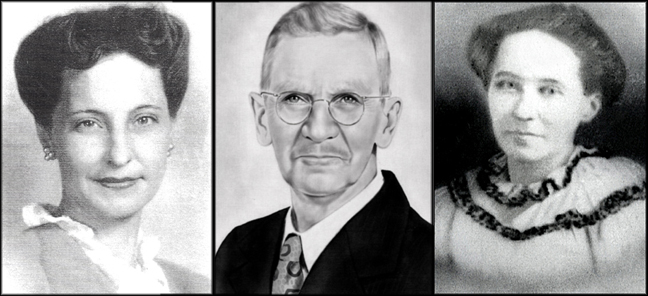In November 2009, Alan Bridwell and I interviewed Ruth Cacy Fink at her Johnson City home. I then wrote a feature story about her long life in East Tennessee. She rewarded me with a copy of her well-written 21-page journal that documented her past remembrances. In addition, Julia Fisher-Rhees, her granddaughter, made a DVD of our dialogue and produced copies for family members.
During our visit with her, the Erwin native showed me her collection of memorabilia, which included some old newspaper clippings, school annuals, photographs and other related items. She also displayed two old undated poems that dealt with the fondness of farm life, which seemed to be of particular importance to her.



(L to R: Ruth Cacy Fink and her parents, George Cacy (former Clinchfield Railroad employee) and Virginia Cacy (only known photo of her mother taken when she was about 35)
One poem concerns an old grindstone that was delivered to a family’s farm to serve a vital role of sharpening tools. The other limerick lamented the selling of the old farm that had brought so much joy to the individual who penned it. Since both speak volumes about the cherished memories of growing up in rural America, I decided to reproduce them in today’s column.
The first one is titled, “The Old Grindstone” by Albert Hines:
“Grandfather bought it years ago, When he was starting out. There were no tractors, trucks or cars, The day he hauled it out.
“He placed it by the woodshed door, Some sixty years ago, And there it ground the farmstead tools, Come rain or sleet or snow.
“Each fall it ground the axes keen, In spring the mattock’s blade. At harvest time it lent a hand, Beneath the maple’s shade. How things have changed since that warm day. Grandfather bought the stone, And hauled it in the rude oxcart, To his new cabin home.
“Tall men who swung the cradle then, Are sleeping on the hill. The voice that called them home at noon, Is forevermore still.
“New faces came upon the scene, New feet ran out to play, But by the woodshed door the stone, Turned on from day to day.
“And though I used to hate the stone. It ground so hard and slow. I love it now because it knew, Those folks of long ago.”
The second one is named, “I Have Sold the Farm” by Adda C. Hall (Fall Branch, Tennessee):
“I have sold the farm where I was born, For a house on a crowded street. I have sold the bracing breeze of morn, For the city’s dust and heat.
“I have sold the pine tree’s glory grand, And the pale pink apple bloom. The roses set by mother’s hand, Long years she’s slept in the tomb.
“I have sold the lane across the hill, Where the children went to school, The rippling laughing mint-fringed rill, And the boys’ old swimming pool.
“I have sold the sycamore down in the glen, The chestnut tree on the hill, The ducks, the sheep, the pigs in the pen, And the family horse – Old Bill.
“I have sold the farm where mother came, A happy blushing bride, The farm that has borne the family name, And been the family’s pride.
“I have sold the mocking bird’s nest in the vine. And the whippoorwill’s song no more, Will cheer this aching heart of mine, As it has in days of yore.
“I have sold the graveyard on the hill, Where my loved ones peacefully sleep; Where the wild birds build their nest at will, And the stars lone vigils keep.
“Oh, why did I sell the things I loved best, I ask myself o’er and o’er, I have sold the farm – its peace and rest, And I’ll regret it forevermore.”
I love Ruth’s poignant poems. Those who grew up working the land will likely identify with them. They evoke pleasant memories of the hard yet fulfilling life on the farm.